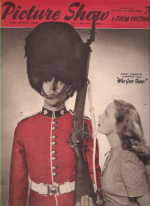Plot
Sir Hubert Cornwall is a member of the royal household and lives with his adult children Miles and Alex in a grace and favour house. One weekend, noticing the house is empty, Queen's Guard sentry Arthur Crisp installs his ex-girfriend there while she recovers from an accident. Miles returns unexpectedly and assumes Christina is a burglar, and soon falls in love with her. Alex appears and tries to reunite Christina with Arthur, who has been caught leaving his post and faces a court martial. When Sir Hubert returns he frees Arthur by telephoning Buckingham Palace, and Arthur and Christina are reunited.
Reception
The Monthly Film Bulletin wrote: "Made in the canned style of Home at Seven , this traditional British farce is a rather more competent exampie of much staple fare in the '30s, It s all very larkish and class-conscious, charaded to the manner born by Nigel Patrick, Valerie Hobson, and A. E. Matthews, and with distinct unease by Anthony Bushell, Peggy Cummins and George Cole." [6]
Kine Weekly wrote: "Streamlined farcical comedy. ... Clean, brightly burnished fun smoothly put over by an attractive cast and a resourceful director. It's admirably equipped to amuse all types of audiences." [7]
Variety wrote: "First-class escapist fare. Dialog is crisply written. Picture is smoothly directed and a good compact all-round cast extract every ounce of fun. ... Good camera work and smart editing round out the technical qualities." [8]
Leslie Halliwell said: "Very British romantic farce, dully and quickly filmed from a West End success." [9]
In British Sound Films: The Studio Years 1928–1959 David Quinlan rated the film as "good", writing: "Well-oiled class-distinctions farce; a popular success." [10]
This page is based on this
Wikipedia article Text is available under the
CC BY-SA 4.0 license; additional terms may apply.
Images, videos and audio are available under their respective licenses.
